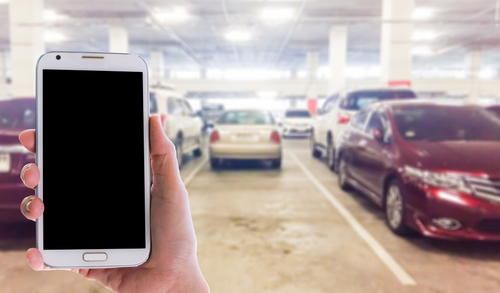I remember how the pay parking garage experience used to be. I’d have to press a button to get a ticket from a machine at the entrance and wait for the mechanical arm to go up. Then, I would drive up and down rows and floors looking for a spot. Some garages required me to leave my ticket on my windshield after parking.

After coming back to my car, I’d wait in a line of traffic to pay the ticket, and the attendant would scan it and tell me how much I owed. After paying, the attendant would press a button to move the mechanical arm up so I could leave.
I always thought, “There has to be an easier way!”
Why Is Upgrading Important?
Owners of pay parking garages are dependent on parking revenue, and it’s important for facilities managers to help them make the experience as quick, pleasant, and high-tech as possible to encourage repeat business. The New York Times article “The Parking Garage of the Future” explained that the pandemic encouraged the industry to adopt more customer-friendly, technological, and touchless solutions.
Pay parking garage owners can serve guests utilizing airports, office buildings, city downtown areas, commercial, health care, hotels, stadiums, conference centers, universities, and mixed-use communities.
The next evolution for paid parking systems involves the smartphone, which can provide basic information, reserve spaces, allow payments, and warn or cite those committing a violation.
Of course, facilities managers should ensure there are provisions in case customers do not have a cellphone, their phones do not work, or they prefer to pay by cash, such as by setting up kiosks or pay stations in the attached facility and weatherproof outdoor kiosks on multiple floors of the garage.
Provide Parking Garage Basic Information
First, facilities managers should work with information technology and security professionals to make information on their garages easily available for those using a smartphone. Consider highlighting the following:
- Street address, GPS address (if it’s different), and nearby facilities that are served by it;
- Garage capacity, the number of floors, and the location of handicapped parking spaces;
- Parking rates, as well as the maximum daily fee;
- Maximum duration of parking and associated fines for violators;
- Access hours;
- Valet parking availability; and
- Garage or level restrictions to specific visitors.
Implement Reservation-Based Space Management
A 2022 survey shows that 82% of parking officials have their own mobile pay parking app. These types of systems allow drivers to reserve parking spaces, and payment can be required when making the reservation.
Facilities managers should consider integrating this with a holistic smart parking technology system, which could include:
- Digital display boards that show how many spaces are vacant on each floor;
- A separate digital sign that states that a garage, a floor, or an entrance/exit is closed because it’s reserved or for maintenance purposes; and
- A green (vacant) or red (occupied) light in aisles to show a parking space’s status.
A Non-Reservation Way to Make Payments
For those who don’t make reservations, facilities managers should implement a pay parking solution via a mobile app so customers can pay their preferred way by entering the following information into the app:
- Zone number or parking space number
- License plate number
- Length of time for parking
- Credit/debit card or other payment information
Right before the time expires, drivers will get a notification that they could pay more to extend their stay, but those who don’t extend their time and are parked beyond the end time could get a warning or a fine.
Mobile Parking Enforcement
Parking enforcement personnel can use their smartphones to connect to a cloud-based enforcement system to help them identify which vehicles made payments.
The benefits of this include:
- It eliminates handwritten tickets, as security can work with police to get access to DMV records that have contact details of car owners so they can be sent a push notification. If enforcement includes utilizing license plate readers, understand the ethical and legal issues as explained by the Americans with Civil Liberties Union (ACLU) and the National Council of State Legislators (NCSL), respectively.
- Digital marking of time-restricted spots by parking personnel to eliminate the need to mark tires with chalk.
- It allows enforcement personnel to be more efficient in patrols.
- Guests can easily pay for citations through cellphones via an online portal.
- As citation tickets cannot get blown off windshields or lost, it increases the percentage of those who pay tickets, which helps the facility generate more revenue.
According to Passport, “with such a convenient process, payment compliance usually improves, and this results in higher citation revenue for the operation.”
Therefore, it’s important to define the present and future needs of your pay parking garage to determine what technology you would like to implement.
